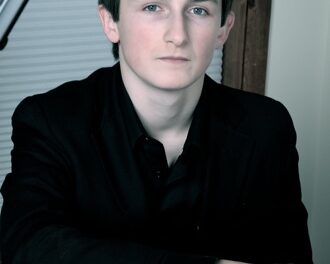À la carte, Greensboro’s eclectic chamber concert series, launched its second season with a concert at First Presbyterian Church.
It would be good to refer to the concert program linked above because there was no printed program – surely a liability for folks without cell phones – and because if we were to talk about everything and everybody, there would be no room left for commentary.
This was basically a vocal chamber music evening, featuring two notable singers, guest soprano Lorena Guillén and series co-director Clara O’Brien, mezzo-soprano. The numerous accompanying instrumentalists are a veritable who’s-who of top Triad area artists (mostly). We’ll list their names and give their websites below* but please visit the online program for photos and more information.
The program itself spanned close to 800 years of music, most of it rarely heard, and with better-known composers bracketing a little-known one whose short song cycle received its world premiere.
To begin at the beginning, there was a lovely duet for two solo voices consisting of a sequence from Las Huelgas Codex, an early 14th-century Spanish collection (and one of the first intended for women), sung, ethereally, from the rear balcony of the church.
Three excerpts from Bach’s Cantata 170 – two arias and an intervening recitative – featured the mezzo with glorious accompaniment consisting of flute, oboe d’amore, string quartet, and harpsichord, all deftly coordinated by Lance Hulme, the NCCU-based composer who is the series’ other director. Here the radiance of the singing was matched measure for measure by the richness and keen incisiveness of the instrumentalists.
The evening’s premiere was of Four North Carolina Seasons by Richard Langellotti (b.1962), a Rocky-Mount-based Doctor of Optometry who (like Charles Ives long ago), composes in his spare time. The new cycle addresses the seasons of the Tar Heel state with haikus describing typical weather during each. These were handsomely vocalized by Guillén, supported with admirable attentiveness by pianist Richard Auvil. English is clearly not the singer’s native tongue, but her accent in fact served to enhance the charm of these short and generally episodic songs.
Guillén seemed much more at home with three magnificent tangos, accompanied by her husband, pianist (and composer) Alejandro Rutty, who played both piano and bass guitar (not simultaneously) with oft’-passionate involvement. The three tangos were “Los mareados” (The Dizzy Ones) by Juan Carlos Cobián, “Sueño de barrilete” (Kite Dream) by Eladia Blázquez, and “Cantando” (Singing), by Mercedes Simone; all three were given in arrangements by Alejandro Rutty. (These pieces were not called out in the program, but fans of this very special genre may wish to have the titles and then perhaps to seek out these artists’ forthcoming recording, due in January. Readers will know the form of these vocal gems from widely-known music by Astor Piazzolla, whose quasi-opera Maria de Buenos Aires is tango from start to finish.)
A short song by Joni Mitchell (b.1943) did not seem at all out of place in the bracing context of the program. Performed as a duet by the two singers with oboe d’amore, guitar, and piano (Hulme) accompaniment, “Songs to Ancient Children Come” (one piece) created a very favorable impression and generated warm response.
Last but hardly least there were the six Grieg songs to Ibsen texts, published as the miniaturist master’s Op. 25 and gloriously realized by O’Brien (in Norwegian that sounded completely convincing). The set includes several of the composer’s finest works, pieces that appear regularly on recital programs of the world’s leading singers, songs like “A Swan,” “With a Waterlily,” and “A Birdsong” (nos. 2, 4 and 6 of the set). What made the evening quite exceptional, beyond the beauty of the singing, was Hulme’s arrangements in support of these songs, played by oboe/English horn, clarinets/bass clarinet, French horn, and the same five strings cited earlier. I am frankly at a loss to convey in words how much these winds, particularly, the parts so idiomatically written, added to the gripping emotion of these songs.
Now about that program…. Yes, there were comprehensive notes, photos and links to bios, texts, and translations at the presenter’s website, but going forward here’s hoping these folks raise enough money to put out at least a one-page (printed) list of the works to be given and the names of the performers. (Not everyone has a cell phone and/or chooses to use one during a concert.)
And – oh, yes – the musicians may not need an interval (since they were in frequent motion), but the audience could have stood at least a stretch break half-way through this 85-minute program.
Names and links for artists not already identified, above, are given here in alphabetical order:
Ashley Barret, oboes
Susan Bates, harpsichord
Kelly Burke, clarinets
Tadeu Coelho, flute
Alexander Ezerman, cello
Stephanie Ezerman, violin
Stephen Landis, bass
Abigail Pack, horn
Scott Rawls, viola
Wendy Rawls, violin
Baron Tymas, guitar
Note 1: The church is huge, occupying most of an entire city block, and the side entrance to the sanctuary is actually from the west, rather than at its formal street address on North Elm. The small parking lots are somewhat removed from the entry, too. Once inside, the venue is truly impressive and very beautiful as well.
Note 2: À la carte is a remarkable undertaking, worthy of enthusiastic support, and it will need a lot of support if it intends to offer wide-ranging programs like this one, featuring such a large cast of musicians, in the long term.
Stay tuned for the ensemble’s next concerts in 2018.











